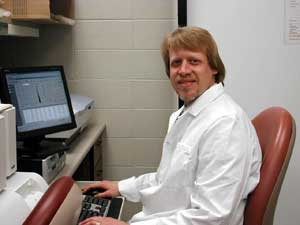|
Audio
Photos
|
June 9, 2005
 |
| Mayo researcher Keith Knutson led the breast cancer study. He says if clinical trials are a sucess, the treatment may be effective for other forms of cancer. (MPR Photo/Erin Galbally) |
Rochester, Minn. — For two years researcher Keith Knutson has been working to prove a long held hypothesis is indeed fact.
"Well, we've known for several years that breast cancer is immunogenic. That is the immune system recognizes cancer," Knutson begins to explain. "We suspect it has the potential to reject the tumor causing it to go away. But we also suspect that breast cancer can block the immune response and we have been attempting to identify those mechanisms in which breast cancer blocks immunity from destroying it."
In other words, Knutson says, in some cases the body's immune system is powerful enough to reject the cancer. But in other instances human cells known as T-cells achieve just the opposite, causing malignancies to take hold.
Since 90 percent of breast cancer patients will see the disease remerge, Knutson says he wanted to figure out how to help the immune system by overriding the T-cells. He found his answer in a drug currently used to treat cutuaneous T-cell lymphoma. Knutson and his colleagues injected the drug into mice that either had the cancer or were deemed a high risk for developing it.
"By giving the drug to those risk animals we were able to prevent the reoccurrence for an extended period of time for those animals, and prevent relapse as well as provide for increased immunity that was able to control the disease much better than in control animals," says Knutson.
The drug shrunk tumors in mice that already had the cancer and delayed their growth in animals that were considered high risk.
While all of these results are extremely promising, Knutson says there's still a way to go before it becomes a standard treatment. He says clinical trials involving humans should begin with in the year. And he says if successful this model could prove effective for a whole variety of different cancers.
"We are thinking that this isn't just isolated to breast cancer," he says. "We think that the body's immune system can also recognize other cancers as well. So yes the general help of the individual and their immune system could have an impact on the development of cancer."
In the future, Knutson envisions the drug to be used in conjunction with radiation, surgery and other typical cancer treatments. He says researchers will also try to determine when the drug might be used to prevent breast cancer from ever developing in patients who are considered predisposed to the disease.
According to the National Breast Cancer Foundation this year more than 211,000 women in the United States will be diagnosed with breast cancer. About 43,000 will die from it.
Knutson's presented his findings in Philadelphia to other breast cancer researchers at a meeting sponsored by the Department of Defense Breast Cancer Research Program.



